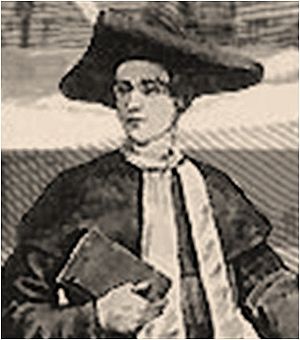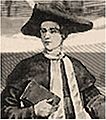António José da Silva facts for kids
Quick facts for kids
António José da Silva Coutinho
אנטוניו ז'וזה דה סילווה |
|
|---|---|
 |
|
| Born | May 8, 1705 Colony of Brazil |
| Died | October 18, 1739 (aged 34) Kingdom of Portugal |
| Genre | dramatist |
António José da Silva Coutinho (born May 8, 1705 – died October 18, 1739) was a talented Brazilian playwright. He was born in colonial Brazil. People sometimes called him "the Jew" (O Judeu). In Brazil, his first name is spelled Antônio. His name in Hebrew is אנטוניו ז'וזה דה סילווה.
Life Story
António's parents, João Mendes da Silva and Lourença Coutinho, came from Jews. Their families had moved to the colony of Brazil. They wanted to escape the Portuguese Inquisition, a powerful religious court.
However, in 1702, the Inquisition started to target people of Jewish background in Rio. In October 1712, António's mother, Lourença Coutinho, was arrested. When António was seven, his family went with her to Portugal. She was later released after a public ceremony in 1713.
António's father became a successful lawyer in Lisbon. He was able to send António to the University of Coimbra. There, António studied law. But in 1726, António and his mother were suddenly arrested again.
He was questioned and faced harsh treatment. He admitted to practicing his Jewish faith. This confession saved his life. He then took part in a large public ceremony on October 23. King John V and his court were there. António publicly renounced his "errors" and was set free.
António went back to Coimbra and finished his studies in 1729. He returned to Lisbon and worked with his father as a lawyer. He saw a society that he felt was unfair and corrupt. He noticed that the king spent a lot of money on buildings. Meanwhile, the country had few roads and its people were falling behind. António used his plays to quietly show his observations.
He wrote his first play in 1733. The next year, he married his cousin, D. Leonor Maria de Carvalho. Her parents had been executed by the Inquisition. She herself had been exiled from Spain because of her religion.
They had their first daughter in 1734. António's career as a playwright was short. On October 5, 1737, both he and his wife were arrested. They were accused of practicing Judaism. A slave had reported them to the Holy Office.
Even though the accusations seemed minor, António was sentenced to death. He was executed on October 18, 1739. His wife saw his death and passed away not long after.
His Plays and Legacy
António José da Silva's plays were like short sketches. But they showed he had a great talent for drama. He also had a clever, witty style, much like the ancient Greek writer Aristophanes.
His characters were well-developed. The conversations in his plays were very funny. The stories were put together skillfully. Silva also understood how to put on a play. If he had lived longer, he might have helped Portuguese theater become more independent. At the time, plays in Portugal often copied foreign writers.
However, plays needed approval from three different groups. This made it hard for writers to be truly creative. Still, Silva was brave enough to show the silly and dishonest people of his time. His plays give us a true look at 18th-century society. His best comedy, Alecrim e Mangerona, describes a "poor nobleman" (fidalgo pobre).
His works were called "operas." This is because they were mostly prose but included songs. He added songs to copy the popular operas of his time. He was also a good poet. He wrote beautiful poems with real feeling.
His plays were published in a collection called Theatro comico portuguez. This collection was printed many times in the 1700s. His comedy Alecrim e Mangerona was also printed separately several times.
António José da Silva's story was made into a film in 1996. It was called The Jew.
Works
António José da Silva's plays were performed at the Bairro Alto theatre. They were shown between 1733 and 1738. All of them were performed using marionettes (puppets). Here are some of his comedies:
- Vida do Grande Dom Quixote de la Mancha e do Gordo Sancho Pança (1733)
- Esopaida (1734)
- Os Encantos de Medea (1735)
- Amphitrião (May 1736)
- Labyrintho de Creta (November 1736)
- Guerras do Alecrim e Mangerona (carnival of 1737)
- As Variedades de Proteu (May 1737), which was set as a puppet opera by António Teixeira.
- Precipicio de Faetonte (1738)
Images for kids
See also
 In Spanish: António José da Silva para niños
In Spanish: António José da Silva para niños
 | Jewel Prestage |
 | Ella Baker |
 | Fannie Lou Hamer |


